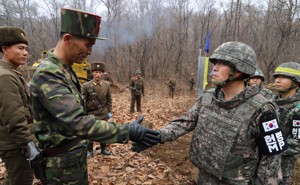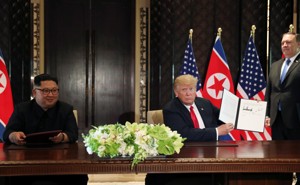Go to 18 Full List
Go to 16
Editor's Note: This article is one of 50 in a series about Trump's first two years as president.
When historians in the 22nd century search for the moment when reality television was at its most influential, they may well pinpoint June 12, 2018.
That was the day entertainment converged with existential danger, low-budget cinematography with high-stakes diplomacy. Less than a year after threatening to unleash “fire and fury” on the leader he called “Little Rocket Man” (and also “short and fat”)—and just a few months after trading threats with him about the size and potency of their respective “Nuclear Buttons”— Donald Trump became the first American leader to meet his North Korean counterpart, Kim Jong Un, as 3,000 journalists from around the world gathered in Singapore to transmit the spectacle. But perhaps the height of unreality was this: The former Apprentice star revealed that he had sought to persuade North Korea’s dictator to abandon his nuclear weapons by showing him a faux movie trailer produced by “Destiny Pictures,” more commonly known as the National Security Council.
Since the Singapore summit—where he insisted on meeting alone with Kim and summarily suspended U.S.–South Korean military exercises—Trump has kept the show going, preparing for another summit with the North Korean leader and professing his “love” for the tyrant in Pyongyang.
Read: Here’s what Trump actually achieved with North Korea
The decision to pitch denuclearization as if it were a buddy action film is more significant than it first appears; it’s a distillation of what distinguishes the president from his predecessors on international affairs. And there’s a chance, however slight, that the gambit will actually succeed where decades of more conventional methods to prevent North Korea from going nuclear have failed.
Approaching foreign policy with a real-estate mogul’s yen for dealmaking and a reality-TV maven’s hankering for high drama, Trump has shown himself willing to put everything—the United States’ alliances, American values such as democracy and human rights—up for negotiation.
The movie trailer, and the summit’s other theatrics, accordingly presented Kim with a vivid choice between continuing to live under threat of U.S. attack or relinquishing his nuclear arsenal in exchange for a prosperous future of beachfront condos and glittering cityscapes. Ignoring the North Korean government’s human-rights abuses, the trailer placed the leader of the free world and the leader of one of the world’s most repressive countries on equal footing, with the narrator declaring that the two men are among the “very few” people on Earth in a position to “renew their homeland” and “change the course of history.”
More Stories
Read: The man behind the North Korea negotiations
Thus far, Kim is not acting like a man prepared to renounce nuclear weapons; in a New Year’s address, he hinted at limiting his arsenal but threatened to go “a new way” if the United States keeps sanctioning and pressuring his country. He’s probably more alarmed than attracted by the capitalist economy conjured in the trailer, because opening North Korea to outside influences risks obliterating his totalitarian rule. If anything, Pyongyang seems to be seizing on the characterization of nuclear talks as a leader-to-leader affair in order to bypass harder-line U.S. officials and strike a deal solely with the more malleable American president.
Nor, however, is the 35-year-old Kim particularly thrilled about ruling over a sclerotic economy at the barrel of an American gun for decades to come. The seemingly impossible mission of U.S. negotiators is to convince North Korea’s leader that in the long term he will be more secure if he reaps the benefits of denuclearization than if he clings to nuclear weapons at all costs.
In transforming this task into reality TV, Trump has brought the Korean peninsula to the brink of war, cast doubt on the future of the U.S.–South Korea alliance, and, for the moment anyway, merely papered over the problem of North Korean nukes rather than solving it. But even non-fans of the Trump Show must reckon with the fact that nothing else has succeeded in weaning North Korea’s leaders off nuclear weapons either.




